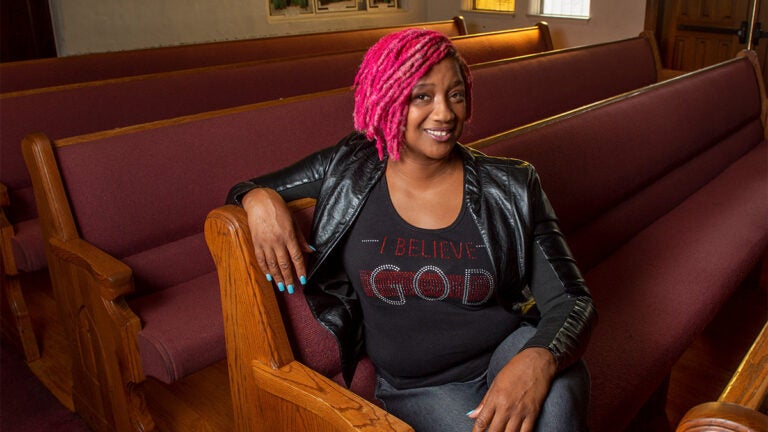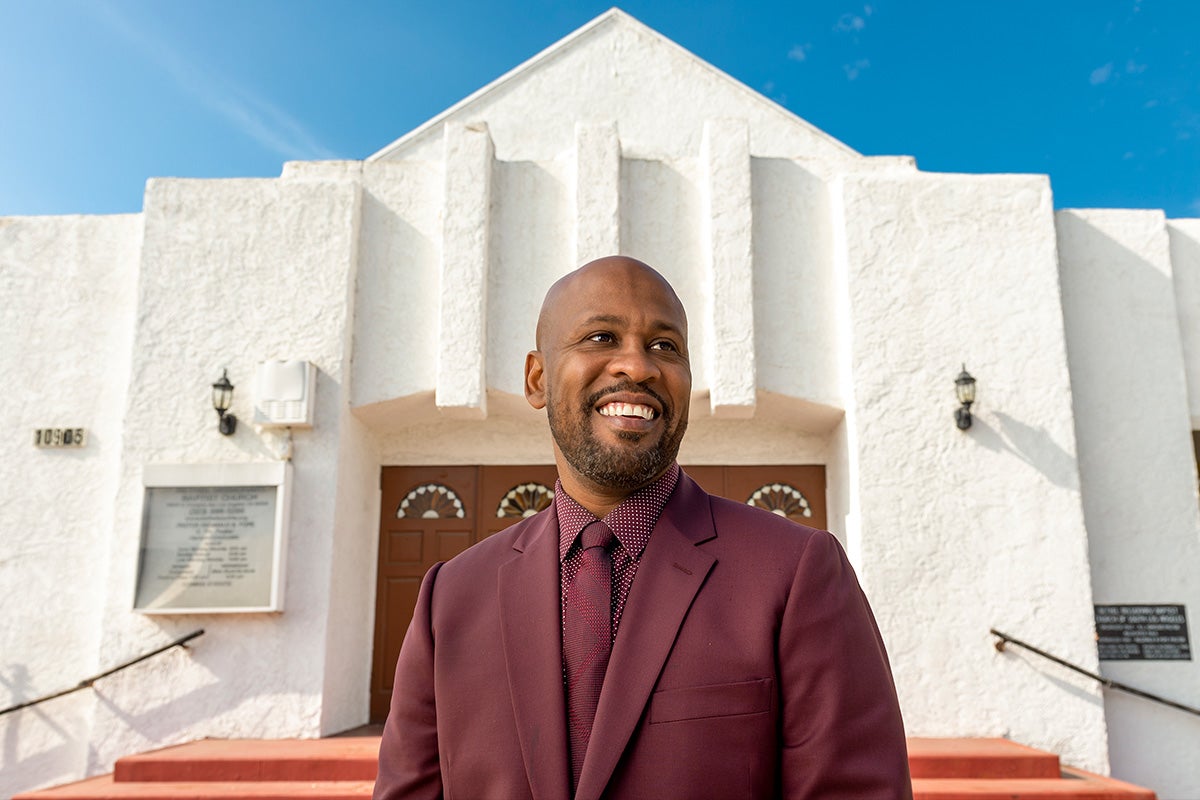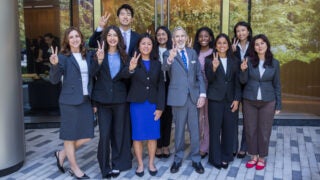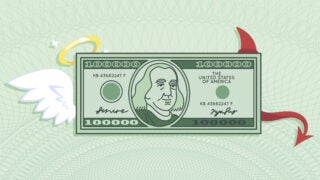
Rev. Najuma Smith-Pollard, founding pastor of the Word of Encouragement Community Church in Los Angeles, has seen Black churches drive social change in the city.
Why Activism Thrives in L.A.’s Black Churches
Pastors advocate for their communities from the pulpit and on the streets — and training at USC gives them the tools to take their work further.
Many members of the Rev. Najuma Smith-Pollard’s church near downtown Los Angeles struggled for food during the COVID-19 pandemic. So, she joined other church leaders to distribute groceries like chicken, pasta and cheese.
When the parishioners needed to see a doctor or get cancer treatment, church staffers secured them a safe ride through a vehicle loan program.
And after the deaths of George Floyd and other Black Americans at the hands of police, Smith-Pollard marched with congregation members on the streets of L.A. in protest. Standing alongside Mayor Eric Garcetti at a 2020 press conference as civil unrest rocked the nation, she urged Angelenos to stand up against injustice together.
The founding pastor of Word of Encouragement Community Church considers it all part of her calling.
If you’re any way conscious or aware, your faith informs your activism.
Najuma Smith-Pollard
“It’s not faith or activism,” says Smith-Pollard, assistant director of community and public engagement at the USC Center for Religion and Civic Culture. “My faith informs my activism. It’s not a choice. I think that’s the case for a lot of people in the Black church. How we do activism might differ. That activism might take place through the arts, through protest, through the pen.
“But if you’re any way conscious or aware, your faith informs your activism.”
Smith-Pollard and her fellow religious leaders build on a long and storied legacy of advocacy, change and community outreach in Black churches in Southern California and beyond. These congregations that minister primarily to Black Americans have played a pivotal role in sparking waves of social change, from protest gatherings with Martin Luther King Jr. to rebuilding efforts after the Rodney King civil unrest to regional social justice and economic equality reforms today.
“To tell the story of social change in L.A. and not bring in the Black church would not be a truthful account,” Smith-Pollard says. “It must include the church.”
How the Black Church Helped Drive Social Change Throughout History
The story of how the Black church became such a powerful voice of activism, change and outreach stretches back many years, Smith-Pollard says, to the fight for abolition. Black preachers condemned slavery in the runup to the Civil War, and many leading abolitionists and rebels had strong ties to the church. Nat Turner, for example, turned to the Bible to guide his actions as the leader of one of the bloodiest revolts against enslavement.
“People would plan to escape slavery, or sharecroppers would try to figure out how to fight for their rights and discuss the latest killing of a Black man,” Smith-Pollard says. “Those meetings would happen in these little churches. It has always been our place, where our issues took center stage.”
Another noted abolitionist, Frederick Douglass preached his message of freedom and equality from the pulpit as an ordained minister at the African Methodist Episcopal Zion Church. Black religious leaders and other members of the Black community joined white collaborators to create the Underground Railroad, helping thousands of enslaved people escape bondage. Many scholars agree that Christianity became a unifying force for enslaved Americans of African descent, giving them a shared identity and sense of resilience.
That shared struggle against inequality, injustice and violence culminated in the 1950s with the civil rights movement. Again, churches played a crucial role in organizing protest marches and sit-ins, with a charismatic young minister stepping to the fore as a leading voice in the crusade. Martin Luther King Jr. placed religion at the center of the fight for equality, declaring the movement an effort “to save the soul of the nation.”
And he brought that message to California. From the late 1950s through the 1960s, he delivered many poignant speeches in South Los Angeles churches, and they similarly served as gathering places for activists and protesters. Following the civil unrest during the Watts Rebellion in 1965 and again after the Rodney King verdict in 1992, Black church leaders gained national attention for their calls for accountability, change, peace, justice and solidarity.
It’s not just about preaching, ministry is about doing. It goes beyond the four walls of the church.
Najuma Smith-Pollard
Smith-Pollard learned about the Black church’s roots in social justice and activism from her mentor, the Rev. Cecil “Chip” Murray. She studied under the influential pastor and civic leader at First African Methodist Episcopal Church. Later she completed the “Passing the Mantle” program he established at USC, the precursor to the USC Cecil Murray Institute for Community Engagement’s Faith Leaders Institute. The institute brings together clergy and lay leaders of faith-based organizations and empowers them to become community advocates. Leaders learn how to change public policy, hold government officials accountable and find support for social issues like job and housing equality, gang violence, immigration reform and health disparities.
Murray espoused the idea that the church serves its community not only through Sunday sermons and religious celebrations, but also through outreach and engagement every day.
“It’s not just about preaching,” Smith-Pollard says. “Ministry is about doing. It goes beyond the four walls of the church. It should be about meeting the needs of the people. And let’s be clear, Rev. Murray was doing this work long before the Rodney King case.”

A Voice of Calm Resolve from the Pulpit Helps L.A. Rebuild
In 1992, the civil unrest after the Rodney King verdict in Los Angeles thrust Black church leaders into the national spotlight. Ministers like Murray urged calm and tried to quell violence on city streets after the acquittal of four Los Angeles police officers in a trial over King’s beating.
Alvin Stafford remembers the mayhem, disorder and chaos that followed the April 29 verdict in the King case. He was a junior at Compton High School then, and he remembers his mother standing in a doorway, blocking him from getting into his friend’s car. They wanted to join the uprising.
“I was 15 and my friends were outside waiting,” he says. “She refused to let me be part of the looting. She said, ‘Over my dead body will you go outside this door.’ My mother is from the country; she picked cotton in Louisiana. She wasn’t a negotiator. She was very direct and stern with her words, and I wasn’t a disrespectful kid.”
He soon learned that one of his friends in that car had been shot at a shoe store. Shaken, he saw unrest devastate the communities of South L.A. Then he heard about Murray’s efforts to bring people together to demand justice and accountability with composed determination rather than violence. The pastor’s commitment stirred him.
His church was so big and his congregation was so large that he could calm city blocks by saying, ‘Let’s talk’ or ‘Peace, be still’ or ‘Let’s pray about it.’
Alvin Stafford
“His church was so big and his congregation was so large that he could calm city blocks by saying, ‘Let’s talk’ or ‘Peace, be still’ or ‘Let’s pray about it,’” Stafford says. “He had the ability to control the mood of his neighborhood and community with his voice. It was just jaw-dropping to see how someone could have the power and authority. And this was pre-YouTube and social media. The only way that people would get information like this was when they came to church.”
Stafford also watched his own uncle guide the Bethel Missionary Baptist Church in Watts as pastor for 45 years. His calling pulled at him, and he soon became ordained as a minister. To guide his flock, he attended Murray’s faith leadership program at USC.
The courses he took there helped him recognize the impact of leaders like Murray and the Rev. Mark Whitlock, another prominent voice in the Black church since the early 1990s. Their lessons tied faith and activism together inseparably.
“It wasn’t just about how you preach a sermon,” says Stafford, now Bethel’s senior pastor. “It was in that class where I found that conviction to make sure that when I became a pastor, not only would I preach the word of God, but I would also make sure the people got services, clothing, jobs, expungements, vaccines — all of those resources that they may not have known about or have the ability to fight for. So, it became the church’s job to get them.”
Community and Solidarity Remain at the Heart of the Black Church
Like Stafford, Smith-Pollard grew up attending church with her family. Her grandmother attended a Baptist church near Denker Avenue and 102nd Street. Her grandfather was active in the Second Baptist Church under the Rev. Thomas Kilgore Jr., a longtime mentor of Martin Luther King Jr. who helped him spread his message of justice in Southern California and across the country. Kilgore had helped organize the civil rights movement’s 1963 march on Washington, D.C., and in the 1970s, he became a special advisor to three USC presidents to build bridges with the surrounding community. Throughout the careers of both Kilgore and Smith-Pollard, ministry remained at the core of life.
We’ve always been in church. It’s always been the place for everything, from celebrations to acknowledgments to social justice.
Najuma Smith-Pollard
“We’ve always been in church,” Smith-Pollard says. “It’s always been the place for everything, from celebrations to acknowledgments to social justice.”
A critical moment in Smith-Pollard’s journey came when she visited Murray’s First African Methodist Episcopal Church, known colloquially as FAME. There, she heard Murray speak about Jesus being Black, something she had never heard before. Less a reference to Jesus’ appearance, which is unknown, Murray spoke to his life experience and knowledge of oppression.
“That’s why I stayed at FAME at age 17 and remained there until I was ordained,” Smith-Pollard says. “It was the profound way in which he articulated the Blackness of Jesus that brought things into greater focus for me.”
Studying under Murray, she became a minister at FAME in the mid-1990s. After serving as pastor at several other churches around Southern California, she established Word of Encouragement in 2014, where she emphasizes civic engagement and public outreach.
That approach proved invaluable as Angelenos grappled with the spread of COVID-19.
“We had to go from pew to virtual and still serve the community,” Smith-Pollard says. “But what I saw the church do is making it clear that the church is not defined by its walls and pews and pulpit. It’s defined by what we do for the people — feeding people in need, testing for COVID, providing information to communities of color. It also maintained that place where people can come and get their spirit fed. That’s so important in a pandemic.”
Similarly, Stafford’s church became a critical source of information and support during the crisis, including efforts to combat vaccine hesitancy and hunger. For Stafford, witnessing his community struggle with poverty, sickness and homelessness drives him to act.
“The job is to love the people that you serve,” he says. “It’s impossible to ignore those needs while saying that you love them. Love is action. Love is saying, ‘Hey, I see that you’re struggling, and I’m going to fight for opportunities for you so that you are no longer struggling.’”
Legacy of Social Change in the Black Church Lives On
Just as the church began grappling with the challenges of COVID-19 and its disproportionate effects on communities of color, many states away, a police officer pressed his knee into the neck of a Black man until he died. George Floyd became the latest name on a painfully long list of people of color killed at the hands of law enforcement. Andre Hill. Breonna Taylor. Freddie Gray. Tamir Rice. Philando Castile. Atatiana Jefferson.
“It became the breaking point. We just couldn’t take it anymore,” Smith-Pollard says. “I saw pastors get really active in protesting or holding our local agencies — the LAPD and local government — accountable to make sure we aren’t repeating this behavior. Pastors have become more vocal and active in that space.”
That activism gives Stafford optimism for the future of the Black church amid social change. As long as it continues to take up the causes and issues of the people it serves, he has confidence in its crucial place in the community.
I’m bullish on the impact the church can have and I’m looking forward to how we can continue to celebrate Martin Luther King’s legacy by caring about the people completely.
Alvin Stafford
“I’m bullish on the impact the church can have and I’m looking forward to how we can continue to celebrate Martin Luther King’s legacy by caring about the people completely — the whole person, not just the soul of the person,” he says.
Likewise, Smith-Pollard sees the institution as a place of power and healing that will evolve and thrive in the face of challenges and struggles.
“Don’t count the Black church out,” she says. “We’re not going nowhere. In the words of P. Diddy, we ain’t going nowhere.”
Editor’s note: Gustavo Solis contributed reporting to this article.



